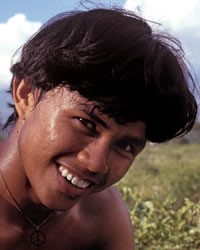Kaili Ledo in Indonesia

Photo Source:
Copyrighted © 2026
Anonymous All rights reserved. Used with permission |
Send Joshua Project a map of this people group.
|
| People Name: | Kaili Ledo |
| Country: | Indonesia |
| 10/40 Window: | Yes |
| Population: | 409,000 |
| World Population: | 409,000 |
| Primary Language: | Kaili, Ledo |
| Primary Religion: | Islam |
| Christian Adherents: | 2.00 % |
| Evangelicals: | 0.01 % |
| Scripture: | New Testament |
| Ministry Resources: | Yes |
| Jesus Film: | Yes |
| Audio Recordings: | Yes |
| People Cluster: | Kaili-Tomini of Sulawesi |
| Affinity Bloc: | Malay Peoples |
| Progress Level: |
|
Introduction / History
The Kaili Ledo people live in the mountainous northern part of Central Sulawesi in the city of Palu and the surrounding areas of Biromaru, Dolo, Marawola and Tawaili. This area is known to be one of the driest places in Indonesia.
The people speak multiple Kaili dialects, of which Ledo is considered the most prestigious. Each of the dialects takes its name from its word for "no". The Kaili Ledo language is closely related to the Baras, Kaili Da'a, Kaili Unde languages.
What Are Their Lives Like?
The Kaili Ledo value family relationships and ancestral traditions very highly. They give great honor and obedience to their parents and elders. The family as a whole makes major decisions together.
Marriage arrangements reflect a mixture of Islamic and traditional influences.
Families of the bride and the groom negotiate the bride price based on the social status of the girl. Polygamy is legal but not common. After marriage, the couple usually lives with one of their families until they have a child.
The Kaili Ledo live in relatively small villages along the roads or waterways.
The coastal Kaili Ledo grow wet rice and coconuts. A few earn their living as traders or government workers. Those living in the mountain region make a living by planting rice and corn. More recently, cacao has replaced cloves as a major cash crop.
The Kaili play a musical instrument called the kakula, similar to a xylophone.
What Are Their Beliefs?
The Kaili Ledo cling proudly to their Islamic identity and seek to follow the five pillars of Islam. Like many Muslim groups in Indonesia, they mix Islam with aspects of animism, including beliefs in magic and spirits. Many seek the help of a dukun (shaman/healer/occultist) to cure sickness or to exorcise evil spirits. When a new house is built, or when planting and harvesting, the Kaili Ledo perform ceremonies to the spirits to ensure good luck and a good harvest.
What Are Their Needs?
The Kaili Ledo need assistance to increase the quality and quantity as well as variety of their agricultural products. Formal education in schools, as well as exposure to new appropriate technologies could increase their employment opportunities and aid in the development of their local economy.
Prayer Points
Ask God to bless the Kaili Ledo people with an abundant harvest as a testimony of his power and goodness.
Thank God for the availability of the New Testament and the JESUS Film in the Kaili Ledo language; ask God to send loving, dedicated workers to proclaim the gospel to this group.
Ask God to free the Kaili Ledo from the influences of spiritism and create within them a hunger for the truth.
Pray for Kaili Ledo disciples to make more disciples.